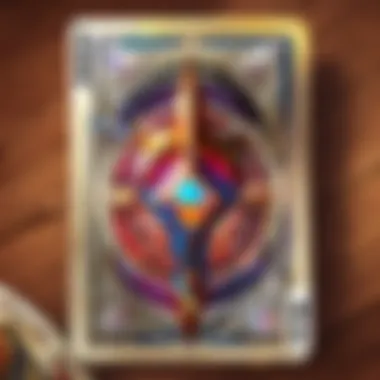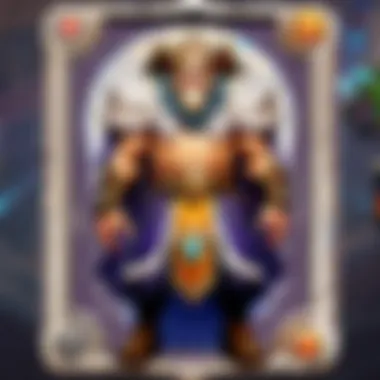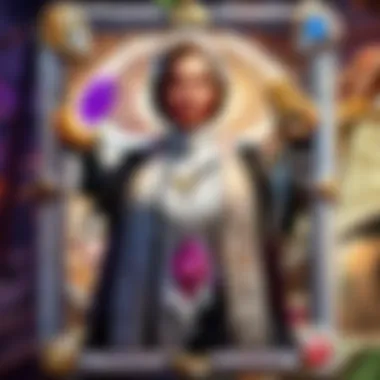Discovering Online Card Games with Magic: The Gathering Gameplay Essence


Game Updates and Patches
In the dynamic world of online trading card games akin to Magic: The Gathering Online, staying abreast of game updates and patches is paramount. Let's delve into the recent developments within Hearthstone, assessing how these modifications have influenced gameplay. By meticulously analyzing the alterations and their implications, players can adapt their strategies to align with the evolving landscape of the game.
Detailing the nuances of the latest updates in Hearthstone unveils insights into the changing dynamics of the game. From new cards to revised mechanics, each adjustment has the potential to shift the meta and players' approaches. By dissecting these changes, gamers can strategize effectively, leveraging the alterations to augment their gameplay and outmaneuver opponents.
An insightful analysis of the impact of new cards and mechanics added through patches enriches players' understanding of the game's intricacies. Identifying the synergies between the introduced elements and existing strategies enables players to anticipate emerging trends and fine-tune their tactics for optimal performance. Furthermore, exploring the rationale behind these updates fosters a deeper appreciation for the evolution of Hearthstone as a competitive platform.
Deck Strategies and Meta Analysis
Navigating the intricacies of deck strategies and meta analysis in games similar to Magic: The Gathering Online demands a blend of shrewd tactics and adaptive thinking. Unveiling top deck recommendations tailored to diverse play styles and skill levels empowers players with versatile options for honing their competitive edge. By exploring the current meta and deciphering popular deck archetypes, gamers can gain valuable insights into prevailing trends and refine their deck-building expertise.
Strategizing against popular decks and implementing effective tech choices necessitates a thorough understanding of the meta's nuances. By dissecting the strengths and weaknesses of prevalent strategies, players can devise counterplay tactics to mitigate threats and optimize their win rates. Moreover, adeptly countering popular decks reinforces players' adaptability and strategic acumen, fostering a dynamic and engaging gameplay experience.
Card Reviews and Set Reviews
Embarking on a journey of card reviews and set evaluations immerses players in a realm of strategic depth and nuanced decision-making. Delving into the attributes and potential impact of new cards lays the groundwork for informed deck construction and innovative gameplay approaches. Evaluating card synergies within different archetypes allows players to craft synergistic decks that capitalize on strategic cohesiveness and tactical versatility.
Conducting set reviews focusing on value, versatility, and competitive viability equips players with the knowledge needed to make astute card choices and construct well-rounded decks. By analyzing sets through a lens of strategic relevance and competitive viability, gamers can optimize their card selections and elevate their gameplay to new heights. The critical evaluation of card sets underscores the importance of strategic foresight and adaptability in navigating the ever-evolving gaming landscape.
Player Guides and Tips
Empowering players with comprehensive guides and strategic insights is instrumental in fostering growth and enhancing gameplay experiences. Beginner's guides elucidating core game mechanics and strategies serve as foundational stepping stones for novice players, offering a structured approach to learning the intricacies of the game.
Advanced tips for improving gameplay and decision-making cater to seasoned players seeking to refine their skills and elevate their strategic prowess. By delving into nuanced gameplay strategies and tactical maneuvers, advanced players can expand their strategic repertoire and outmaneuver opponents with finesse. Additionally, arena drafting strategies and arena-specific gameplay tips provide players with a competitive edge in high-stakes gameplay scenarios, enriching their overall gaming experience with heightened levels of strategic depth and calculated precision.
Introduction
In this article, we embark on a journey to explore games akin to Magic: The Gathering Online, unraveling a tapestry of online trading card games that offer a reminiscent gameplay experience. Delving into the intricacies of these games, we dissect various elements that parallel the essence of Magic: The Gathering Online. By scrutinizing gameplay mechanics, strategic depth, and card diversity, players can unearth alternative options that cater to their gaming preferences and strategic inclinations. Through a meticulous examination of each game's unique aspects, this exploration aims to provide a comprehensive guide for players seeking new and engaging online trading card experiences. As we navigate through each subsection, a vivid landscape of diverse gameplay styles and strategic challenges unfolds before us, offering a rich tapestry of gaming alternatives for enthusiasts of the genre.
Understanding Magic: The Gathering Online
Magic: The Gathering Online is a complex and strategic digital trading card game that has captured the interest of players worldwide. Understanding the intricacies of Magic: The Gathering Online is crucial for players aiming to excel in its competitive landscape. By delving into its gameplay mechanics, community dynamics, and tournament structures, players can grasp the depth and nuances that make this game a staple in the online TCG genre.
Gameplay Mechanics
Turn-based Strategy
Turn-based strategy in Magic: The Gathering Online plays a pivotal role in the decision-making process during gameplay. Players take turns to strategize their moves, creating a dynamic and suspenseful environment where every decision carries weight. The strategic depth offered by turn-based gameplay enhances player engagement and ensures strategic thinking is paramount in achieving victory. While it may prolong game duration, it allows for meticulous planning and thoughtful execution of gameplay strategies, adding a layer of complexity that enthusiasts appreciate.
Card Types and Abilities


One of the defining features of Magic: The Gathering Online is its diverse range of card types and abilities. From creatures to sorceries, each card brings a unique element to the game, enabling players to craft intricate strategies and surprise their opponents. The deep pool of possibilities stemming from card types and abilities fosters creativity and adaptability, making each gameplay session unpredictable and engaging. However, the multitude of options can also lead to analysis paralysis, requiring players to strike a balance between synergy and versatility in their deck compositions.
Deck Building
Deck building serves as the foundation of success in Magic: The Gathering Online, allowing players to customize their card collection to suit their playstyle. The process of selecting cards, optimizing mana curves, and refining strategies is a creative endeavor that tests players' deck-building skills. A well-constructed deck can tilt the odds in a player's favor, while a poorly assembled one can lead to inevitable defeat. Deck building is a meticulous process that demands foresight, adaptability, and an understanding of game mechanics to create a winning combination.
Mana System
The mana system in Magic: The Gathering Online is a fundamental aspect of the game, shaping the pace and flow of gameplay. Mana acts as a valuable resource that powers spells and abilities, requiring players to manage their mana pool efficiently to cast powerful spells. The strategic allocation of mana influences tactical decisions, as players must weigh the benefits of playing certain cards against saving mana for potential threats. Embracing the mana system optimally is crucial for maintaining control of the game and outwitting opponents.
Community and Tournaments
Competitive Scene
The competitive scene in Magic: The Gathering Online is a vibrant arena where skilled players showcase their talents and compete for prestigious titles. Engaging in competitive play tests players' strategic acumen and adaptability, fostering a culture of continuous improvement and skill development. The robust competitive scene offers a platform for players to challenge themselves, learn from seasoned veterans, and establish their presence in the gaming community.
Social Interactions
Social interactions play a significant role in the Magic: The Gathering Online community, connecting players, fostering friendships, and creating a sense of camaraderie. Engaging in discussions, sharing gameplay experiences, and collaborating with fellow enthusiasts enhances the overall gaming experience, enriching the community with diverse perspectives and insights. Social interactions break the barriers of virtual gaming, building lasting connections that extend beyond the digital realm.
In-game Events
In-game events in Magic: The Gathering Online provide players with exciting opportunities to test their skills, earn rewards, and experience unique gameplay modes. From themed tournaments to special challenges, in-game events inject variety and excitement into the gaming landscape, enticing players to engage actively and push their limits. Participating in these events fosters competitiveness, encourages skill development, and cultivates a sense of accomplishment among players, enhancing the overall gaming journey.
Criteria for Comparable Games
Strategic Depth
Complexity of Gameplay:
A pivotal aspect that defines the strategic depth of a trading card game is the complexity of its gameplay mechanics. By delving into intricate rules, interactions, and decision-making processes, players are presented with a challenging yet rewarding gaming experience. The nuanced approach to gameplay complexity offers a myriad of strategic possibilities, fostering a dynamic environment where skill and foresight are key. While this level of complexity may pose a learning curve for newcomers, it ultimately enhances the depth and longevity of the gaming experience.
Skill Expression:
Skill expression within a game emphasizes the player's ability to showcase their strategic prowess and tactical acumen. It transcends mere luck or chance, inviting individuals to utilize their knowledge and expertise to outmaneuver opponents. The incorporation of skill expression not only adds layers of depth to gameplay but also fosters a competitive landscape where mastery is continually rewarded. However, balancing skill expression without alienating casual players remains a crucial consideration in maintaining a diverse and inclusive gaming community.
Tactical Decision-making:
Another critical component of strategic depth lies in tactical decision-making, where players are tasked with making pivotal choices that can sway the outcome of a match. Strategic foresight, adaptability, and calculated risk-taking all play a role in honing an individual's decision-making skills. The incorporation of tactical decision-making elevates the gameplay experience by encouraging critical thinking and strategic planning, imbuing each move with significance and impact.
Card Diversity and Customization
Unique Card Mechanics:


The incorporation of unique card mechanics within a trading card game adds a layer of unpredictability and strategic depth. By introducing cards with distinct abilities, interactions, and features, players are presented with a diverse array of options to explore and strategize around. This diversity not only enhances the replay value of the game but also encourages experimentation and creativity in deck building, fostering a dynamic and evolving meta-game.
Variety of Playstyles:
A game's appeal often lies in the variety of playstyles it accommodates, catering to a diverse player base with differing preferences and approaches to gameplay. Offering multiple viable strategies and archetypes allows players to express their individuality and preferences, creating a rich tapestry of playstyles within the gaming community. The presence of varied playstyles ensures that every match is a unique and engaging experience, promoting inclusivity and strategic innovation.
Deck Customization Options:
Deck customization serves as a cornerstone of player agency and personalization within a trading card game. The availability of diverse cards, deck-building tools, and customization options empowers players to tailor their decks to suit their playstyle and strategic preferences. From tweaking card ratios to experimenting with different synergies, the depth of customization enhances player engagement and investment in the game, fostering a sense of ownership and creativity.
Exploring Alternative Online Trading Card Games
In this section of the article, we delve into exploring alternative online trading card games that offer a similar gameplay experience to Magic: The Gathering Online. This exploration is crucial for players looking to broaden their gaming horizons and discover new strategic challenges in the realm of online card games. By highlighting the key elements and considerations of these alternatives, players can make informed decisions based on their preferences and gaming styles.
Hearthstone
Dynamic Gameplay Elements:
Dynamic Gameplay Elements in Hearthstone bring a distinctive flavor to the gaming experience. These elements introduce unpredictable elements that keep players engaged and on their toes. By incorporating unexpected twists and interactions, Dynamic Gameplay Elements add excitement and strategic depth to the game, making it a favored choice for gamers seeking a thrilling and ever-evolving gaming environment. Despite their unpredictable nature, these elements offer a fresh and dynamic gaming experience, enhancing the overall excitement and challenge levels for players.
Accessible Mechanics:
The accessibility of mechanics in Hearthstone is a significant draw for both new and experienced players. The game's mechanics are designed to be user-friendly and easy to understand, making it approachable for a wide range of players. This accessibility ensures that players can quickly grasp the gameplay nuances and dive into the strategic aspects without feeling overwhelmed. The simplicity of the mechanics allows for a smoother learning curve, enabling players to focus more on the strategic depth and enjoyment of the game.
Evolving Meta:
The evolving meta in Hearthstone adds a layer of complexity and engagement to the game. The shifting landscape of strategies and deck compositions keeps the gameplay fresh and exciting, encouraging players to adapt and innovate their approaches continually. This dynamic aspect of the meta ensures that no two matches are alike, promoting strategic thinking and creative deck-building techniques. While the evolving meta presents challenges in terms of adaptability, it also offers opportunities for players to showcase their skills and strategic flexibility, ensuring a captivating and immersive gaming experience.
Legends of Runeterra
Multi-region Deck Building:
The concept of multi-region deck building in Legends of Runeterra opens up a myriad of strategic possibilities. By allowing players to combine cards from different regions, this feature enables diverse and hybrid playstyles that cater to various preferences. The flexibility of multi-region deck building promotes strategic experimentation and customization, empowering players to create unique and synergistic decks that align with their preferred gameplay strategies. While the complexity of managing multi-region decks can present challenges, it also offers a rich and rewarding gaming experience that emphasizes creativity and strategic depth.
Skill-based Combat:
Skill-based combat in Legends of Runeterra emphasizes player expertise and decision-making prowess. The game mechanics prioritize skillful gameplay over luck or chance, rewarding strategic thinking and tactical execution. Engaging in skill-based combat requires careful planning, calculated risks, and adaptability during matches, making each game a test of wit and skill. This focus on player skill enhances the competitive nature of the game and sustains a challenging yet gratifying gaming environment that appeals to players seeking intellectual stimulation and strategic satisfaction.
Strategic Depth:
The strategic depth of Legends of Runeterra offers a wealth of tactical options and intricate strategic puzzles for players to unravel. The game's rich gameplay mechanics and card interactions provide a solid foundation for strategic decision-making, fostering a nuanced and intellectually stimulating gaming experience. Emphasizing foresight, planning, and adaptability, the strategic depth of the game ensures that players are constantly engaged in thoughtful gameplay that rewards calculated risks, tactical ingenuity, and strategic finesse. Despite the complexity of strategic depth, it enhances the overall gameplay experience by offering a deep and immersive strategic landscape for players to explore and master.


Gwent: The Witcher Card Game
Distinct Gameplay Mechanics:
Gwent: The Witcher Card Game stands out for its unique gameplay mechanics that differentiate it from traditional card games. The game mechanics in Gwent prioritize hand management, precise timing, and strategic card placement, requiring players to think strategically and plan their moves meticulously. These distinct gameplay mechanics offer a refreshing and cerebral gaming experience, challenging players to employ tactics beyond mere card strength. While mastering these mechanics may pose a learning curve for some, they provide a rewarding and intellectually stimulating gameplay environment that appeals to players seeking strategic depth and tactical finesse.
Unique Card Abilities:
The diverse and unique card abilities in Gwent set the game apart in the online card gaming landscape. Each card possesses distinct and specialized abilities that contribute to the strategic diversity and depth of gameplay. By strategically utilizing these unique card abilities, players can craft innovative strategies, counter opponents effectively, and adapt to dynamic gameplay situations. The emphasis on card abilities adds layers of complexity and decision-making to matches, requiring players to think critically and creatively in utilizing their cards' potential. While navigating through the variety of card abilities can be challenging, it offers a fulfilling and intellectually stimulating gameplay experience that rewards strategic thinking and foresight.
Strategic Deck Building:
Strategic deck building in Gwent plays a pivotal role in the game's strategic landscape and player decision-making process. Crafting a well-balanced and synergistic deck requires careful consideration of card synergies, faction strengths, and strategic objectives. The strategic depth of deck building in Gwent empowers players to express their playstyles, experiment with unique strategies, and tailor their decks to counter specific matchups effectively. While the strategic nuances of deck building demand time and strategic acumen to master, they offer players a sense of agency and creativity in shaping their gameplay experiences, fostering a dynamic and intellectually stimulating competitive environment.
Eternal Card Game
Tactical Depth:
The tactical depth of Eternal Card Game provides players with a strategic playground rich in decision-making opportunities and diverse tactical approaches. The game's mechanics emphasize tactical nuance, resource management, and predictive planning, offering a challenging and intellectually engaging gameplay experience. Navigating through the tactical intricacies of Eternal Card Game requires players to think ahead, assess risks, and adapt to dynamic in-game situations, fostering a competitive environment that rewards strategic foresight and tactical expertise. Despite the complexities inherent in tactical depth, they elevate the overall gameplay experience by providing a captivating and intellectually stimulating arena for players to test their strategic acumen and mastery.
Faction Influence System:
The Faction Influence System in Eternal Card Game introduces a dynamic element that influences gameplay strategies and card interactions. Each faction in the game offers unique strengths and playstyles, providing players with strategic versatility and customization options. By leveraging the Faction Influence System, players can explore diverse deck compositions, synergize faction-specific cards, and adapt their strategies based on the prevailing meta. This system encourages strategic diversity and experimentation, fostering a strategic landscape where adaptability and versatility are paramount. While navigating the intricacies of faction influence may pose challenges, it offers players a comprehensive and immersive gameplay experience that encourages strategic exploration and creativity.
Resource Management:
Resource management in Eternal Card Game plays a crucial role in shaping gameplay decisions and strategic outcomes. Balancing resource allocation, card costs, and tactical priorities is integral to success in the game, demanding prudent planning and resource optimization from players. The strategic facet of resource management adds a layer of complexity to gameplay, requiring players to make informed decisions, manage their resources efficiently, and adapt to changing game conditions. Honing resource management skills enhances players' ability to navigate strategic challenges effectively, ensuring a dynamic and intellectually stimulating gameplay experience that emphasizes foresight, adaptability, and tactical acumen.
Artifact
Lane-based Strategy:
The lane-based strategy in Artifact introduces a tactical dimension that sets it apart from conventional card games. By incorporating multiple lanes for gameplay, Artifact creates a dynamic and strategic environment where players must balance lane control, card placement, and strategic positioning. This unique gameplay feature adds depth and complexity to matches, encouraging players to strategize across different lanes, anticipate opponent moves, and leverage lane-specific effects to their advantage. While mastering lane-based strategy requires strategic vision and adaptability, it offers a diverse and intellectually stimulating gaming experience that challenges players' tactical acumen and decision-making skills.
Item Cards:
The inclusion of item cards in Artifact introduces a strategic layer that enhances gameplay dynamics and player interactions. Item cards provide additional tools and enhancements that players can use to bolster their units, alter game dynamics, and gain tactical advantages. The strategic utilization of item cards allows players to customize their gameplay strategies, respond to in-game situations dynamically, and outmaneuver opponents through strategic item deployment. While managing item cards effectively requires adaptability and foresight, it enriches the gameplay experience by offering strategic depth and tactical opportunities for players to explore and exploit.
Marketplace Mechanics:
The marketplace mechanics in Artifact offer a unique twist to the traditional card game formula by introducing an economy-driven element to gameplay. Players can buy, sell, and trade cards within the marketplace, enabling strategic decision-making regarding card acquisition and investment. This dynamic marketplace system adds a layer of resource management and planning to matches, requiring players to balance card purchases with in-game strategies effectively. The marketplace mechanics encourage strategic foresight, adaptability, and resource optimization, providing players with an engaging and intellectually stimulating gameplay experience that blends card strategy with economic considerations.
Conclusion
One of the specific elements that underline the significance of the Conclusion is its role in providing a decisive resolution to the comparisons and analyses made between various online trading card games. Through succinct summarization, the Conclusion aims to distill the key insights uncovered in preceding sections, enabling readers to grasp the overarching similarities and differentiators among the featured games effectively.
Moreover, the Conclusion offers notable benefits to readers by elucidating the strategic nuances and gameplay dynamics of each explored game in a cohesive manner. By outlining the core strengths and unique attributes of titles like Hearthstone, Legends of Runeterra, Gwent: The Witcher Card Game, Eternal Card Game, and Artifact, the Conclusion equips players with valuable knowledge to make informed decisions about which game aligns with their preferences and interests.
Additionally, the Conclusion prompts readers to consider essential factors when selecting an online trading card game, such as gameplay complexity, strategic depth, card diversity, and customization options. This deliberative approach aids players in assessing which game best suits their strategic inclinations and gameplay preferences, enhancing their overall gaming experience and satisfaction.







